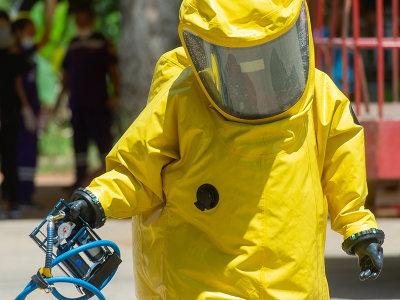Naturally occurring biological threats are an age-old problem that have vexed and terrorized societies for centuries. From the Black Death pandemic in the mid-1300s, to COVID-19's global danger today, these calamities, which killed millions, are a grave reminder that humanity has always faced an unrelenting and ever-evolving microbial threat, which has challenged our health infrastructure.
Prior to the development of germ theory, early societies had little or no knowledge of what these threats were or how to counter them. Through the continued advancement of medicine and life science research, today, society is reaching the point where we can passively and actively work to protect ourselves against these threats. As humanity has grown its knowledge and capability to counter natural threats, the last few decades have also shown dramatic advancements in biotechnologies and synthetic biology.
Yet, even with the advantages of modern science, humans can still find themselves at the mercy of new and emerging biothreats. Therefore, governments must keep a watchful eye on naturally occurring biological hazards, while acknowledging the promise and perils associated with biotechnology and synthetic biology.
To help address objectives identified by a September 2022 White House Executive Order on Advancing Biotechnology and Biomanufacturing, that calls for new ways to prevent traditional biothreats while seeking to leverage advances in biotechnology and synthetic biology, the Intelligence Advanced Research Projects Activity (IARPA) has created the Biointelligence and Biosecurity for the Intelligence Community (B24IC) program.
Biointelligence refers to instruments, knowledge, and/or methods that enhance the Intelligence Community’s (IC) ability to counter inappropriate use of biological sciences or utilize advancements to address biological threats to our nation.
Biosecurity involves methods to secure biological advancements in instruments, knowledge, environments, or capabilities that could potentially cause harm. B24IC seeks to advance research across biointelligence and biosecurity, including bioelectronics, bioengineering, attribution, digital and instrument biosecurity, sample collection, and big data across multiple levels of biology.
“If IARPA can tackle biointelligence and biosecurity advances, we will see substantial IC and national security benefits,” said B24IC’s Program Manager, Dr. Michael Patterson. “That’s why IARPA’s support for this effort is so critical, because the federal government is the only entity with the resources to invest in this kind of technically risky research, which has no clear commercial use, but definite security and intelligence benefits.”
Among other contributions, B24IC will assist biointelligence research by developing: methods to enable biological material attribution and/or origination; highly-sensitive biomolecule detection platforms; and approaches to build autonomous-response-capable biological systems.
B24IC will similarly advance biosecurity through several efforts, including developing methods to: assure digital and physical security associated with infrastructure, instrumentation, databases, and data associated with synthetic biology, biological samples, and biotechnologies; detect and/or characterize biological targets of interest to include venoms, toxins, and other items; and detect near and remote passive health status or health anomalies.
To achieve these advancements, B24IC will rely on performers or organizations with deep biointelligence and biosecurity expertise and experience. These include: Exodigm Biosciences; Quantitative BioSciences, Inc.; The Charles Stark Draper Laboratory, Inc.; Raytheon BBN; Georgia Tech Research Institute; Massachusetts Institute of Technology; Ginkgo Bioworks; and Battelle Memorial Institute.
The B24IC test and evaluation team, who will review the performers’ results, consists of Los Alamos National Laboratory, Sandia National Laboratory, and Naval Information Warfare Center – Pacific.
The B24IC program is anticipated to run in two phases, for a total of 24 months. Phase A will last nine months, while Phase B will be a 15-month effort.
Dr. Patterson recognizes B24IC is an ambitious program with several moving parts, but he’s confident in its success. “This program will help IARPA build a roadmap toward future programs, which will enhance or augment the IC’s ability to address concerns in biointelligence and biosecurity,” Dr. Patterson said. “And while the research being pursued is challenging and the fields themselves are nascent, IARPA is aiming to achieve results in a scientific area where few others in the world can.

